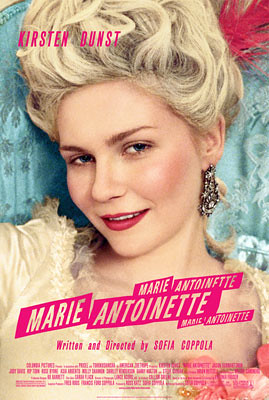This weekend, after what seemed like an eternal void at the cinema, I took it upon myself to go see, not one, not two, but THREE films!
I’ll start from the ground up.
Friday evening, I went to see the Grudge 2, which currently has a whopping
rotten tomatoes tomameter rating of 8%. I believe that Stephen Hunter of the
Washington Post said it best, when he described the Grudge 2 as “a movie so bewildering and impenetrable that I believe it siphoned off a good 40 IQ points.”
I’ve certainly done my fair share of ranting here about the bevy of poor quality horror films that we’ve seen in the last few years. But, at the risk of hyperbole and redundancy, I currently hold the following to be true: The Grudge 2 defies logic and coherency to the point of oblivion. There is no narrative through line. There is no continuity. (There is no Dana, there is only Zool). What there is, however, is a multitude of shot after shot of swarming straight black hair overtaking characters at random and filling up the screen for about ninety minutes or so. I didn’t know whether to laugh, cry or scream.
The plot(s) is as follows. American girl Aubrey (Amber Tamblyn) flies to Tokyo, at the bidding of her mother, to collect her sister, Karen (Sarah Michelle Gellar), who has had a nervous breakdown. If you saw the first Grudge, (which was mediocre at best) you will recall Karen, as the main protagonist, who found herself drawn into the violent web of mystery surrounding “the most haunted house in Tokyo”. After learning the secret of the house, (a husband murdered his wife and child in a jealous rage, after learning she was in love with another man) Karen was confronted with its “evil” and attempted to burn it down, killing her boyfriend in the process.
Cut back to the Grudge 2. Aubrey shows at the Japanese hospital to find her sister seriously disturbed and spouting nonsense. Her sister, then promptly falls to her death, forced off the hospital roof by a ghost (the wife in the house who was killed by her raging husband). Aubrey, scared and alone, befriends a young male journalist who has been tracking the story of this mysterious house. Immediately they begin conversing in cryptic meaningless phrases like “I’m afraid.” “I must find out the truth.” And “How do we stop it?” i.e. they speak without actually saying anything at all. But that’s OK, because thankfully we have two entirely independent plotlines, with which to bang our heads on the theatre seat backs by.
The second plotline revolves around three teenage school girls (with scandalously short uniform skirts to match), who go into the haunted house as –a joke, or –to “check it out.” Their motivation is ultimately unclear and irrelevant. Two of the girls are popular, but the third is not, and as horror film procedure would have it, the two prettier, socially successful girls, force the dowdy girl into the closet. While in the closet, the dowdy girl gets stuck and has contact with the ghost of the house. Unbeknownst to them, the two “pretty” girls were exposed to the evil of the apparition as well, and so all three end up being haunted by Miss broken neck long hair(the ghost).
The third plot line is perhaps the most baffling of all. Back across the big pond, in Chicago, Illinois, we observe the happenings of an American family. A father with a teenage daughter and pre-teen son, has just invited his girlfriend to move into their apartment. We become acquainted with the cheery cheerleading teen, and her Lolita neighbor friend, as well as the general family dynamics. Pre teen boy resents Dad’s girlfriend, Dad’s girlfriend is nervous about making good with the kids, and so on. One night the preteen boy spies a dark figure being led down the hall by two of his neighbors. After that, things start to get weird. People aren’t acting like themselves, and strange visions and sounds make themselves apparent. What on earth could be happening to this family? Unfortunately, you never end up giving a good God damn.
Now keep in mind that the three different plot lines I’ve just summarized, are all intercut with each other willy nilly. The end result is a film that has the continuance of a furniture building manual from Ikea. Characters die, others vanish into the ether, pulled out of the space time fabric by the ghost, while others try to “fight” against the rage. One particularly bizarre subplot involved Aubrey tracking down the ghost’s mother to speak to her about her daughter. It is there we learn via grainy flashback, that when her daughter was a child, she used to perform exorcisms, and force her daughter to swallow the evil spirits. Why would she do such a heinous thing, you might ask? Who knows, I doubt if the filmmaker himself does. Nevermind the fact that this woman is spilling out her deepest darkest secrets in perfect english to Joan of Arcadia. Let’s not even bother to try and explain that.
What I want to know is --why would the writers throw in this haphazard factoid to basically turn the concept of the entire franchise on its head? Impossible to say. Isn’t the whole point, as indicated by the title, that when someone is killed in a horrible rage, that “rage” haunts things forever? When did the franchises M.O. become that little girls who witness exorcisms have spiritual baggage?
The big “reveal” at the end of the film, is that the dowdy school girl who is tormented by the ghost in Japan, is brought back home to her parents in Chicago. Voila! She lives in the very same apartment building as the American family, and was in fact the same mysterious figure wearing an oversized hoodie that the little boy saw walk down the hall. The problem was that, this reveal didn’t serve much purpose. Not only was it obvious and predictable, but it failed to provide context or even link all the storylines, which is what well done reveals typically too. It was the missing piece to a puzzle that still didn’t create a cohesive image. The reveal in The Grudge 2 was a protracted justification for tying together two halves that didn’t make a whole.
There were definitely some frightening moments in the film, and I probably jumped more than I’d like to admit. One of the most disturbing moments for me was when the perky cheerleader popped over to her friend’s apartment, who had fallen under the grudge’s curse. The friend proceeded to chug an entire gallon of milk, and then regurgitate it into the same container. Icky. Also, for all its unoriginality at this point, I still get creeped out my the staccato movements of the ghost with her double jointed limbs and snapped neck.
These movies are most disappointing to me because while they capitalize on clever concepts, conjure up horrific images and moments, and are pretty adept at creating an atmosphere, they lack the quality of story and characters to see them through. In terms of setting a mood, and establishing a visual style, Japanese writer/director Takashi Shimizu clearly knows what he’s doing. But what’s particularly incendiary about The Grudge 2 is that not only does it fall into this category, but it’s nearly impossible to watch. It’s a confounding viewing experience, where one is denied the simple viewer’s pleasure of getting lost in a story --because there truly isn’t one. It is a nightmarish assembly of non-sequesters, a ninety minute music video that’s set to creepy violin tunes. And let’s be honest –there’s a reason why videos are only three or four minutes long at most….
(forthcoming Marie Antoinette…)





